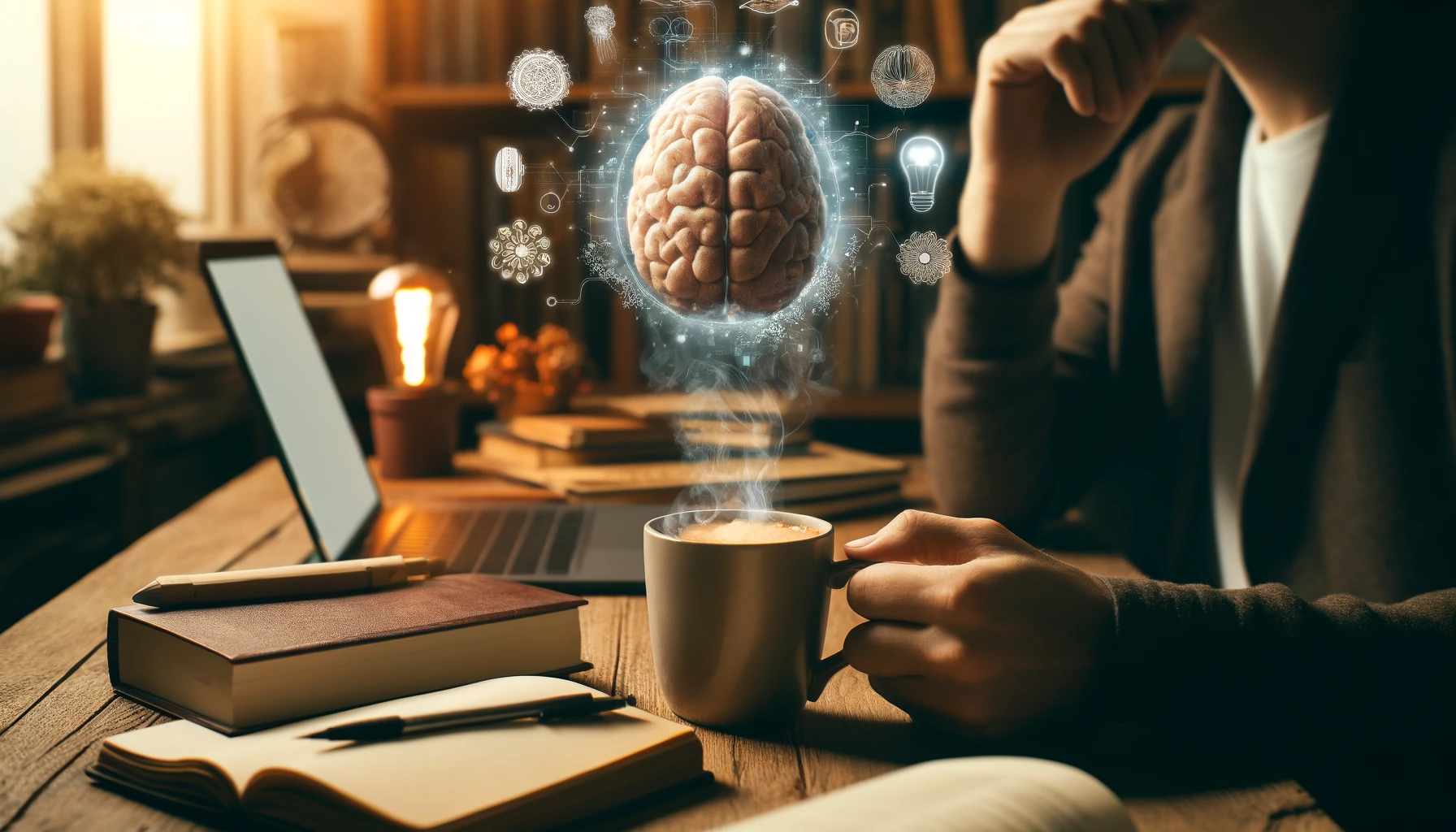Most of us reach for a cup of coffee when we need a boost — to wake up, to focus, to survive a mid-afternoon slump. We associate coffee with energy, and rightly so.
Caffeine, the most widely used psychoactive substance in the world, is a powerful stimulant.
But what if coffee’s impact on the brain goes far beyond “just waking us up”? What if it changes how we think, feel, create, and even connect with others?
In this article, we’ll explore how coffee influences your brain — not only through caffeine, but also through ritual, expectation, and long-term mental patterns. Welcome to the psychology and neuroscience of your favorite drink.
Caffeine 101: What it actually does in the brain
Let’s start with the basics. Caffeine works primarily by blocking a neurotransmitter called adenosine.
Adenosine builds up in your brain throughout the day, creating that feeling of sleepiness. When caffeine blocks adenosine receptors:
- You feel more awake
- Neurons fire more rapidly
- Your pituitary gland signals a boost in adrenaline
But caffeine doesn’t just stimulate. It modulates the activity of several other neurotransmitters — including dopamine, the “motivation” molecule, and serotonin, linked to mood regulation.
So, coffee gives you more than just alertness — it gives you a chemical cocktail of motivation, mood balance, and cognitive activation.
Improved attention and focus
Multiple studies have shown that caffeine enhances sustained attention and reaction time. That’s why coffee is so popular among:
- Students
- Programmers
- Writers
- Gamers
- Surgeons
Caffeine allows you to tune out distractions, stay on task longer, and process information more efficiently. In fact, one study in the journal Psychopharmacology found that caffeine significantly improves performance on tasks that require sustained concentration — especially when you’re already tired.
This doesn’t mean you’ll become a genius overnight. But coffee can help your brain function at a higher level than it otherwise would, especially in low-energy moments.
Boosting short-term memory
Caffeine has been shown to enhance short-term memory, particularly verbal memory.
In one experiment, participants who drank coffee before learning a list of words were able to recall more of them later than those who didn’t. The likely explanation? Caffeine increases the efficiency of neural firing in the hippocampus, the brain’s memory center.
This effect isn’t massive, but in real-world terms it can mean:
- Remembering names in a meeting
- Retaining more from what you read
- Recalling key points from a podcast or video
In the short term, coffee helps your brain encode and access information faster.
Mood elevation and emotional regulation
Have you ever noticed that your mood improves after a cup of coffee — even before you feel more awake?
That’s not just coincidence. Caffeine stimulates the release of dopamine, the neurotransmitter associated with reward and pleasure. It also has an indirect effect on serotonin, which stabilizes mood and reduces anxiety.
In fact, regular moderate coffee consumption has been linked to:
- Lower risk of depression
- Reduced risk of suicide
- Greater emotional resilience during stress
This doesn’t mean coffee is a replacement for therapy — but it does show how it can act as a mental buffer, softening emotional lows and enhancing well-being.
Creativity and divergent thinking
Coffee and creativity have a legendary relationship. Writers, artists, and inventors throughout history have sworn by their daily brew. But does science support the link?
Partially, yes.
Caffeine doesn’t directly increase divergent thinking (the ability to generate creative ideas), but it does:
- Improve working memory, helping you hold and manipulate ideas
- Reduce mental fatigue, allowing longer creative sessions
- Enhance focus, helping with detailed aspects of creation
And don’t forget the psychological power of ritual. Many creatives use coffee as a trigger for the brain: “When I sip this, it’s time to create.” That association is powerful.
Social connection and bonding
Surprisingly, coffee also influences how we interact with others. In social psychology, warm beverages have been shown to create warm emotions.
In one famous study from Yale University, participants who held a warm cup of coffee judged others as more generous and trustworthy than those who held a cold beverage.
That effect translates to:
- More relaxed conversations
- Stronger rapport in meetings
- Better team dynamics in workspaces with coffee culture
So yes — coffee literally warms the brain’s perception of human interaction. It’s a social lubricant with biochemical roots.
Brain protection: Long-term cognitive benefits
Perhaps the most surprising effect of coffee on the brain is its potential protective role against neurodegenerative diseases.
Research has linked regular coffee consumption to:
- Lower risk of Alzheimer’s disease
- Reduced likelihood of Parkinson’s disease
- Slower age-related cognitive decline
The mechanisms are complex and still being studied, but likely include:
- Antioxidants in coffee (polyphenols)
- Anti-inflammatory effects
- Improved insulin sensitivity (linked to brain aging)
- Preservation of dopamine neurons
This makes coffee more than just a short-term mental booster. It might be an ally in brain health for the long haul.
How tolerance and timing matter
Of course, caffeine isn’t magic. Like any powerful substance, its effects can diminish with tolerance.
The more often you drink coffee, the more your brain adapts:
- Adenosine receptors may upregulate
- Dopamine spikes become less pronounced
- The stimulating effects fade over time
That’s why some coffee lovers cycle their intake — taking breaks, switching to tea, or changing timing — to keep sensitivity fresh.
Also important: timing matters. Drinking coffee too late in the day can interfere with sleep, which then negatively affects cognitive function, focus, and memory.
Best practice:
- Have your first coffee 1–2 hours after waking
- Avoid caffeine 6 hours before bed
Anxiety, jitters, and overuse
It’s worth noting that not everyone experiences coffee the same way.
For some people — especially those with anxiety disorders — coffee can:
- Increase restlessness
- Heighten nervous energy
- Trigger heart palpitations
This is often a dosage issue. While 1–2 cups a day can boost focus and mood, 4–5 strong coffees may overstimulate the central nervous system.
If you’re sensitive to caffeine, try:
- Switching to lighter roasts (they usually have more caffeine, oddly)
- Limiting intake to the morning
- Trying decaf or half-caf options
- Experimenting with L-theanine, an amino acid found in tea that can balance caffeine’s effects
Listening to your body is the most important cognitive tool of all.
Ritual and habit formation
The final piece of coffee’s impact on the brain isn’t chemical — it’s behavioral.
Drinking coffee at the same time each day becomes a habit loop:
- Cue: You feel groggy or want to start work.
- Routine: You brew or order coffee.
- Reward: You feel alert, focused, comforted.
Over time, this loop becomes automatic. Your brain begins associating certain activities (like writing, working, or socializing) with the act of drinking coffee — reinforcing the habit on a deep neurological level.
That’s why even decaf drinkers say they feel better after a cup — the reward is built into the ritual itself.
Final thoughts: more than a brain boost
Coffee is so much more than a caffeine delivery system. It’s a complex brain experience — chemical, emotional, social, and behavioral.
It wakes you up, sharpens your focus, boosts your mood, enhances creativity, strengthens bonds, and might even protect your mind as you age.
So next time you sip your favorite brew, know that you’re not just feeding your body — you’re nourishing your brain in ways both subtle and profound.

